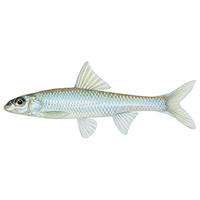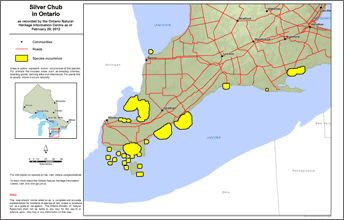Silver chub
Scientific name: Macrhybopsis storeriana

Cover photo credit: Joseph R. Tomelleri
Status
Threatened
“Threatened” means the species lives in the wild in Ontario, is not endangered, but is likely to become endangered if steps are not taken to address factors threatening it.
Date added to the Species at Risk in Ontario List
The Silver chub was assessed as a species of special concern when the Endangered Species Act took effect in 2008. On January 24, 2013 Silver Chub was re-assessed as threatened.
What it looks like
The Silver chub is a relatively large minnow that can grow up to 23 centimetres long. It has a stout and moderately thick body with silver sides, a greyish-green back and silver-white belly. The bottom of the tail is lined in white. At the corners of its mouth there are tiny, fleshy "whiskers" called barbels.
Where it lives
Throughout most of its North American range, Silver chub prefers medium to large rivers with substantial current and silt, sand or gravel bottoms, but in Ontario it is only found in the Great Lakes. It is usually found in depths between seven and 12 metres, and is believed to spawn in May and June in open water areas. It feeds on aquatic insect larvae, crustaceans and molluscs, including Zebra mussels.
Where it’s been found in Ontario
The distribution of the Silver chub includes the Mississippi drainage area from the Great Lakes south to the Gulf coast, east to the foothills of the Appalachians and as far west as the Great Plains. In Ontario, it is found in Lake Erie and Lake St. Clair. It is also found in Manitoba in the Red River and lower Assiniboine River.
View a larger version of this map (PDF)
What threatens it
Threats to the Silver chub may include habitat degradation, changes in water temperature, sediment and nutrient loading, exotic species, changes to food supply and predators.
The Silver chub was considered common in Lake Erie until the 1950s. Its decline there coincided with a reduction in prey, such as mayfly nymphs. In the 1950s and 1960s, excessive runoff of nutrients from urban and farmland pollution resulted in eutrophication of lakes, likely causing the mayfly decline. Eutrophication is the process by which a body of water becomes rich in dissolved nutrients from fertilizers or sewage. This encourages the growth and decomposition of plant life, which results in oxygen-depletion and decreased water quality.
Action we are taking
Special concern species do not receive species or habitat protection.
What you can do
Report a Sighting
The Ministry of Natural Resources and Forestry tracks species at risk. You can use a handy online form to report your sightings to the Natural Heritage Information Centre. Photographs with specific locations or mapping coordinates are always helpful.
Volunteer
Volunteer with your local nature club or provincial park to participate in surveys or stewardship work focused on species at risk.
Be a good steward
- private land owners have a very important role to play in species recovery; you may be eligible for stewardship programs that support the protection and recovery of species at risk and their habitats
- land owners can help improve fish habitat and keep Ontario’s water safe and clean by maintaining natural vegetation next to creeks and rivers, and keeping pollution and soil from washing into Ontario’s rivers; you can find more information about programs and funding assistance for eligible farmers from the Ontario Soil and Crop Improvement Association website
Report illegal activity
Report any illegal activity related to plants and wildlife to 1-877-TIPS-MNR (847-7667).
Quick facts
- the Silver chub may be one species actually benefiting from the invasion of Zebra mussels, because Zebra mussels have improved water clarity in Lake Erie, which may have improved habitat for the Silver chub’s main food source, mayfly nymphs; in addition, Silver chub have been shown to feed on Zebra mussels.
- pollution abatement in and around Lake Erie has improved water quality dramatically, which has helped improve habitat conditions for the Silver chub
